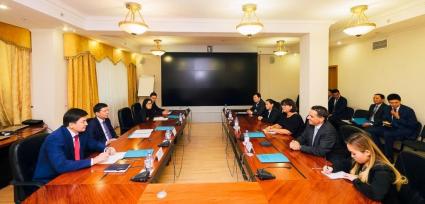Reception of the UIHJ at the Ministry of Justice of the Republic of Kazakhstan
On 23 September 2016 was held in Astana a major International conference co-organised by the National Chamber of private Judicial Officers of Kazakhstan and the UIHJ as part of the celebration of the 5th anniversary of the Kazakh National Chamber.
Meeting at the Ministry of Justice of Kazakhstan with Marat Beketaev (2nd left), Minister of Justice of Kazakhstan

The theme, "Legislative Support for Execution of Judicial Acts - Further Developments of the Institute of Private Judicial Officers in the Republic of Kazakhstan", provided a future vision of the profession in this country.
Several international delegations were represented: Belarus, Belgium, Bulgaria, Czech Republic, Estonia, Moldova, Montenegro, and Serbia.
The delegation of the UIHJ, led by its President, Françoise Andrieux, consisted of Marc Schmitz, First Vice President, Juraj Podkonický, Treasurer, and Guillaume Payan, Director of the Legal Unit of the UIHJ.
The previous day, with Sergei Li, President of the National Chamber of Private Judicial Officers of Kazakhstan, Francoise Andrieux and Marc Schmitz had been received by Marat Beketaev, Minister of Justice of the Republic of Kazakhstan. Together they evoked cooperation opportunities between the Ministry of Justice and the UIHJ. Then more technical topics were discussed regarding the state of the profession in this country and the activities that can be performed by judicial officers.
Thus Francoise Andrieux and Marc Schmitz developed two main themes: statements of facts and debt recovery, based on the CEPEJ Guidelines on Enforcement of 17 December 2009.
The next day, the conference gave the opportunity to the speakers of the various represented countries to uncover their practices regarding the enforcement of court decisions but also to open the horizon to new activities for Kazakh judicial officers.
During the discussions which followed the theme of competitiveness was discussed. Françoise Andrieux pointed out that, it should be exercised if necessary in compliance with the law, ethics and monitoring and control rules adopted by the profession, which are the only guarantees for citizens as part of the proper administration of justice within a system of good governance.


